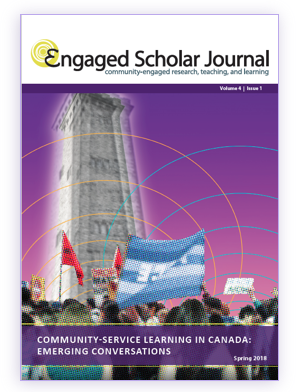Indigenous Methods and Pedagogy: Revisiting Ethics in Community Service-Learning
DOI:
https://doi.org/10.15402/esj.v4i1.314Keywords:
ethics, CSL, transformative dissonance, Indigenous methods and pedagogy, decolonizationAbstract
This paper looks at the development of a teaching module intended to enhance students’ understanding of ethics in a community service-learning (CSL) class. This module, created to meet academic (western) learning outcomes for CSL, is based upon Indigenous pedagogy and methods, and offers a non-western framing of specific community service goals, particularly reciprocity and transformative dissonance. The paper proposes that moving toward Indigenous or other ways of knowing offers students and instructors an entry point into decolonizing practices and into alternate ways of experiencing service, transformative learning, and power dynamics. The paper also includes a discussion of the theory behind the teaching module and focuses on the intertwining of ethical research protocols (from Tri-Council policy, OCAP® principles, and elsewhere), service-learning goals, and Indigenous methods within the context of settler colonial practices and policies. Alongside other traditional service-learning outcomes, the primary goal of the module is to encourage students to become critical thinkers reflecting on the mechanics of power and social inequity as they experience social justice founded upon the ideals of relationship building.
Downloads
Published
How to Cite
Issue
Section
License
Authors who publish with this journal agree to the following terms:
- Authors retain copyright and grant the journal right of first publication with the work simultaneously licensed under a Creative Commons Attribution License CC BY 4.0 that allows others to share the work with an acknowledgement of the work's authorship and initial publication in this journal.
- Authors are able to enter separate, additional contractual agreements for the non-exclusive distribution of the journal's published version of the work (e.g., post it to an institutional repository or publish it in a book), with an acknowledgement of its initial publication in this journal.
- Authors are permitted to post their work online (e.g., in an institutional repository or on their website) after the publication of their work in the Engaged Scholar Journal.
- Please note that while every opportunity will be taken to ensure author participation in the editing process, due to time constraints final copyediting changes may be made before publication to ensure APA adherence throughout all submissions.




